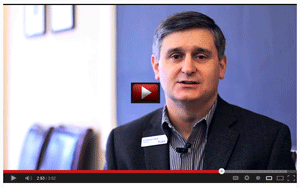Click the image to watch a video interview with Teaching Elder Dr. Stephen Estock, Provisional Coordinator of CEP. This brief video was produced by Covenant Theological Seminary, where Stephen earned his MDiv degree in 1995.
Estock, a native of Alabama, received his BA from Rhodes College, MDiv. from Covenant Theological Seminary, and his Phd. from Cappella . He served at Covenant Presbyterian Church in Montgomery, AL , and most recently serves on the staff of Kirk of the Hills in St. Louis, MO. With his wife Susan, the Estocks have three children: Brandon, Nathan, and Morgan.
Stephen has also taught numerous classes at Covenant Seminary, spoken at various CEP Conferences, including CEP’s women’s leadership conference. He has served on the CEP Committee and chaired the committee for two years which gives him first hand experience and knowledge of CEP’s operation, staff, and procedures.
With the background of Christian education and its discipleship focus, Estock demonstrates the gifts and experience that the CEP Committee believes to be needed for this role. He also is aware of the need to work together with the other committees and agencies of the church. He served as one of CEP’s six board members in the PCA’s joint venture, Great Commission Publications, with the Orthodox Presbyterian Church.
The Committee believes that his understanding of the importance of Christian education and the role of CEP in the PCA, along with his commitment to a team building approach, growing out of his on hands experience in the local church further qualifies him for this position.
According to teaching elder Will Hesterberg, chairman of the CEP search committee, “Stephen Estock has experience of PCA operation and the administration level and appreciates the opportunity to strengthen cooperation between agencies. He is known and respected throughout the PCA.” Hesterberg further stated, “Through our interview and our personal relationships, we believe him to be of a gracious and humble spirit, teachable, and a man who loves God, the church, and his family.”
Dunahoo believes that Estock is God’s provision for CEP at this time, bringing with him a desire to develop a vision for the continuation of CEP’s role in the life of the church and kingdom. Dunahoo said, “Our kindred spirit leads me to believe that he will continue to keep CEP front and center of the PCA’s ministry and make the training and resources for local churches a top priority.”


 Teaching elder Dr. Stephen Estock has been called by the Christian Education and Publications Committee, at its fall meeting, to become the provisional coordinator as of January 1, 2013, according to the RAO (Rules of Assembly Operations). He will be presented to the 41st General Assembly, meeting in Greenville, SC, in June to be elected as coordinator to replace Dr. Charles Dunahoo who will be leaving the position, December 31, 2012.
Teaching elder Dr. Stephen Estock has been called by the Christian Education and Publications Committee, at its fall meeting, to become the provisional coordinator as of January 1, 2013, according to the RAO (Rules of Assembly Operations). He will be presented to the 41st General Assembly, meeting in Greenville, SC, in June to be elected as coordinator to replace Dr. Charles Dunahoo who will be leaving the position, December 31, 2012.